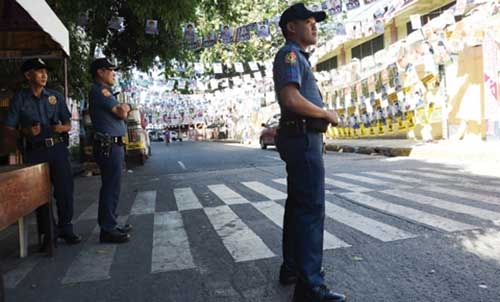Security forces on alert ahead of Philippine poll
Manila: Security forces fanned out across the Philippines Sunday on the eve of national polls, following a vicious and deadly election campaign dominated by presidential favourite Rodrigo Duterte's threats to kill thousands of criminals.
Surveys show Duterte, mayor of the southern city of Davao, has a clear lead in Monday's presidential elections as millions of voters embrace his threats to unleash security forces in an unprecedented crime spree, and shut down Congress if lawmakers oppose him.
President Benigno Aquino, who is limited to a single six-year term, has likened Duterte to Nazi leader Adolf Hitler and warned of a looming dictatorship, with the presidential tensions fuelling an already volatile and violent political culture.
"Their rhetoric is quite vicious, their exchanges are quite vicious and this is a signal to a lot of supporters to up the ante and be more aggressive," Eric Alvia, head of the watchdog group, National Citizens Movement for Free Elections, told AFP.
"This campaign has been divisive and its polarising a lot of people. They (feel they) can do whatever they want."
Duterte has accused Aquino's administration of planning "massive cheating" to ensure that his preferred successor, former interior secretary Mar Roxas who surveys show is trailing in second place, wins.
His followers have warned of a "revolution" if Duterte loses, while military-linked figures have threatened a possible coup attempt if he wins.
Alvia said that the violence was largely taking place on the local levels, but with the leaders' angry rhetoric fuelling matters.
At least 15 people have died in election-related violence this year, according to national police statistics.
In the latest suspected case, a grenade blast killed a nine-year-old girl behind the house of a powerful political warlord in the strife-torn province of Maguindanao late on Saturday, said Chief Inspector Jonathan del Rosario.
Her death has not yet been included in the tally although it likely will be, according to del Rosario, spokesman for a police election-monitoring taskforce in Manila.
"This looks like it is election-related but we have a process we have to follow," del Rosario told AFP.
- Security, vote buying -
In the wake of the blast, armoured vehicles could be seen patrolling the streets of the town while soldiers in camouflage stood guard on vital chokepoints.
Del Rosario said 90 percent of the nation's police force, or about 135,000 officers, were already on election-related duty and had been authorised to carry their assault rifles.
The military has said their forces are also on election duty.
Del Rosario said policemen were guarding polling and canvassing places and manning road checkpoints and were even acting as election officials in a few towns that have been identified as "election hotspots," due to the heated rivalry between politicians.
With more than 44,000 people running for 18,000 positions ranging from president to town councillor, the competition has also resulted in a surge of vote-buying.
"The strategies have changed. We've seen... a shift from just pure money to other things of value, like pigs, livestock," Commission on Elections spokesman James Jimenez told AFP.
"We are receiving stories like people giving away things that are contained in (plastic) dippers, with names of candidates. Sometimes, they give out pails with groceries inside."
Jimenez said politicians had been increasingly forced to resort to buying votes as other tricks, like manipulation of vote tallies, could no longer be applied since elections had largely been automated since 2010.
Election watchdogs said the sums paid for a vote could be as low as a hundred pesos ($2.10) for a post like town councillor with higher amounts for higher positions.
Such small gifts are an effective, if illegal, way for politicians to win support in a nation where roughly one quarter of its 100 million people live below the poverty line.
In response, the commission has banned cellphones from polling places to prevent voters from photographing their ballots so they can get paid when they present proof that they voted the right way.
Related Posts

